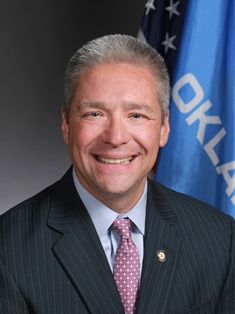In order to provide equal access and equal opportunity to people with diverse abilities, this site has been designed with accessibility in mind. Click here to view
Religious Freedom bill filed
 Sen. Corey Brooks
Sen. Corey Brooks
In response to October’s Supreme Court’s decision to allow lower court rulings against Oklahoma’s ban on same sex marriage to stand, Sen. Corey Brooks has filed legislation to protect the rights of individuals and religious entities who provide marital services within the state. Senate Bill 478 would create the Protection of Religious Freedom in the Sanctity of Marriage Act of 2015.
“The U.S. Supreme Court and lower courts are legislating from the bench and stepping on the rights of Oklahomans who overwhelmingly voted against legalizing gay marriage in 2004,” said Brooks, R-Washington. “Nevertheless, while this issue continues to make its way through the federal court system, gay marriage is now legal in this state. This bill is simply an effort to protect the rights of individuals, specifically members of the clergy, churches, judges, and court clerk personnel, who are morally opposed to this practice, from being forced to participate in it through issuing marital documents or presiding over such marital ceremonies.”
SB 478 would prohibit the government from requiring any individual or religious entity, if it is against their deeply held religious beliefs regarding sex or gender, to provide services, accommodations, facilities, goods or privileges related to conducting any marriage, domestic partnership, civil union or similar arrangement or to have to solemnize such an event.
The bill would also protect these individuals and religious entities from:
* a civil claim or cause of action under state or local law based on such refusal
* an action by any governmental entity to penalize, withhold benefits from, discriminate
against or otherwise disadvantage any protected individual or religious entity under any
state or local law.
The measure also instructs that any person who has authority to take, direct others to take, recommend or approve any personnel action may not take any personnel disciplinary action against any employee who invokes protections under this bill. However, should an individual employed by a governmental or other nonreligious entity invoke protections under this bill and refuse to provide a service that is part of the entity’s duties or policies, the individual’s employer must promptly provide another employee or official to provide the service, if it can be done without undue hardship to the employer.
“This bill is in no way meant to be mean-spirited or hateful. It’s designed simply to codify and clarify that Oklahomans value individual religious freedoms and will do what’s necessary to protect them, for the good of all,” said Brooks. “Last September, few people would have predicted this federal court decision.
Oklahomans who entered into state service as judges, justices and clerks in recent years would have never imagined having to perform gay marriages as part of their official duties. This bill provides protections for those who find such unions morally objectionable so they don’t have to choose between their job and their religious convictions. The same concept applies to the pastors, clergy and churches in Oklahoma who find this practice contrary to their longstanding Biblical doctrine.”
If approved, the bill would go into effect July 1, 2015.
 Oklahoma Senate
Oklahoma Senate

